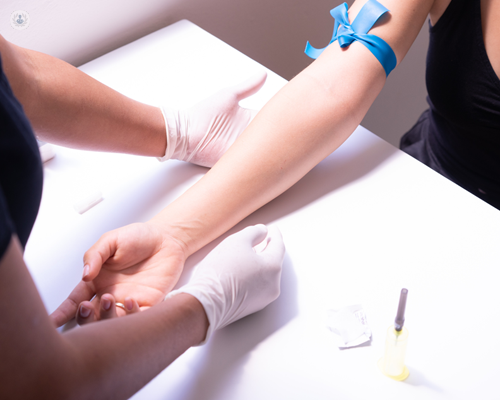How exactly is a cholesterol level test performed?
Written by:Cholesterol is a fatty, wax-like substance that is found naturally in the blood. Too much cholesterol, however, can pose a health risk and increase your chances of heart disease.
In this article, esteemed consultant cardiologist Dr Rajesh Chelliah talks about the importance of cholesterol level testing. Dr Chelliah, who treats patients in Leicester and Nottingham, outlines what a cholesterol test entails and what to do if your test results are high.

How exactly is a cholesterol level test performed?
It's done via a simple blood test. That means taking a blood sample from the patient. The other way is to do is a finger prick test so there are certain machines that will measure your cholesterol level by a single finger prick test which is painless.
Who should consider a cholesterol level test?
In my opinion, anyone above the age of 40 should consider a cholesterol level test. I think if patients have a significant family history of vascular disease or heart disease, and strokes in the family, then you should think about having a cholesterol test earlier on in life because it may be due to a condition called familial hypercholesterolemia that can cause symptoms. So, the earlier you treat it, the better.
For the majority of the population, I would say anyone above the age of 40 - or if you have any conditions like high blood pressure or diabetes you should also get your cholesterol levels checked.
How long will it take, and what should I do before?
The test results take a few days to come back. Your doctor will contact you when they are back. We used to insist that patients take a fasting blood sample for cholesterol but it isn't so important these days. A random cholesterol test is just as good.
How accurate are cholesterol level tests?
These tests are very accurate, particularly if your doctor is taking a blood sample. That's more accurate than a finger prick test, but I think both are fairly accurate in the sense they give you an idea of what your cholesterol levels are.
It's important your doctor also gives you an actual breakdown of cholesterol, so you aren't just looking at the total cholesterol but we want to look at the other components of cholesterol which include LDL, HDL and triglycerides.
What result is a worrying one? What happens after a high cholesterol result?
A high cholesterol level will be highlighted in the blood test, and a doctor will speak to you about it. We like a total cholesterol level of under five, which is good, but under four is ideal. We know that the main target in terms of cholesterol treatment these days is what's called LDL cholesterol level. There are specific medications to deal with the LDL level. We have different targets for different conditions, so I think if you get a high result then you should consult your doctor about what to do next.
If you're concerned about your cholesterol levels, you can consult with Dr Chelliah via his Top Doctors profile.


